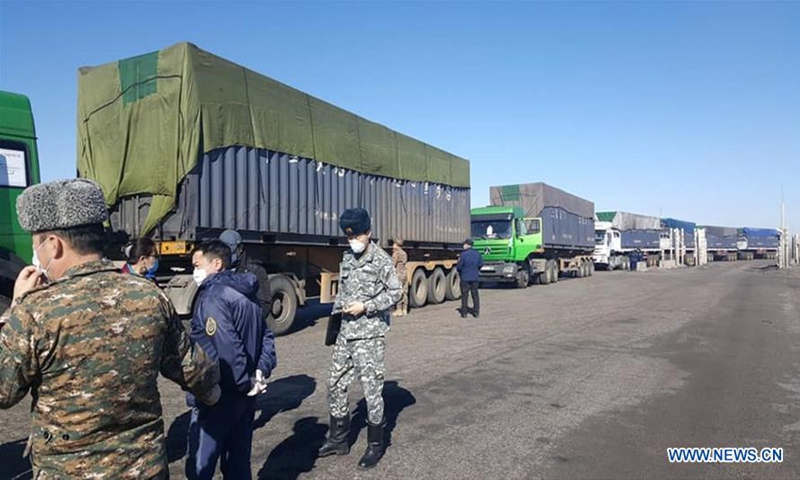
Container trucks loaded with coal wait to leave the Gashuun Sukhait border port in Mongolia. File photo: Xinhua
Chinese Premier Li Keqiang on Tuesday said China hopes to expand coal trade and cooperation with Mongolia to achieve mutual benefits and win-win results, as part of the government's efforts to ensure the stability of the energy supply chain.
While China has abundant coal resources, it still hopes to develop diversified energy cooperation and hopes to expand the scale of the coal trade with Mongolia for mutual benefit, Li said at an online meeting with his Mongolian counterpart on Tuesday.
China encourages and supports companies in the two countries to actively cooperate in accordance with market principles and business rules to ensure the smoothness and safety of the energy supply chain with reasonable and stable prices, Li said.
Mongolia is a key source of coal for China, accounting for more than half of China's total imports in the first two months of 2021, despite some cuts due to the pandemic.
China is also the most important destination for Mongolian coal. According to data from the Mongolian customs, from January to September, Mongolia's coal exports totaled 11.9 million tons, of which 11.3 million tons was exported to China, accounting for about 95 percent of the total.
Meanwhile, companies in China are mulling measures to guarantee stable coal supply as the winter approaches, after heavy rains hit North China's Shanxi Province, China's biggest coal production base.
China Railway Group said on Tuesday that it will improve the transportation of thermal coal in Northeastern China, enhance inventory to ensure the supply for power plants within seven days, and strengthen the fulfillment of medium and long-term contracts for thermal coal.
It is one of the latest measures taken to stabilize coal supply.
Leaders from the National Energy Administration (NEA) visited China Energy Investment Corporation on Monday. On the basis of ensuring safe production and legal compliance, the NEA proposed speeding up the release of advanced coal production capacity, increasing coal supply, and strengthening equipment operation and maintenance management.
In order to stabilize coal supplies, Northwest China's Jilin Province purchased 5.6 million tons of coal from North China's Inner Mongolia Autonomous Region at a long-term negotiated price, and imported 300,000 tons of foreign coal in September, according to CCTV.com on Tuesday.
On Sunday, 40 coal companies in Ordos, North China's Inner Mongolia Autonomous Region signed long-term contracts with 63 coal companies in 18 provinces including Heilongjiang, Jilin and Liaoning for the fourth quarter. Supplies of a total of 77.06 million tons were agreed at the ceremony.
Erdos in North China's Inner Mongolia Autonomous Region has rich resources and the city's average daily output has exceeded 2.1 million tons of coal, the highest level since the beginning of this year, according to the Xinhua News Agency on Friday.
The region has reportedly allowed 72 coal mines to increase annual production by nearly 100 million tons of coal.
Premier Li Keqiang chaired a meeting of the National Energy Commission on Saturday, during which he called for an overhaul of a "one-size-fits-all" approach to power and production curbs and efforts to ensure that residents in North China have a warm and safe winter.
Global Times




